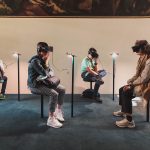
Articles
The Benefits Of Modern Technologies in the Learning Process
By eLearning Inside
July 10, 2021
Modern technologies help us not only in everyday life but in our professional life as well. Thanks to them, we spend much less time on routine activities, and the learning process is becoming much easier.
The modern world is developing at an incredible speed—progress concerns all spheres of our life, but especially education. If we compare learning materials and teaching methods of the past decade to the present time, the difference will certainly be noticeable. Modern students gain knowledge and receive the maximum of information in the shortest possible time.
Currently, there is a huge amount of modern technologies and multimedia software for PCs, which are widely used in education to collect information, conduct research, or acquire knowledge in various subjects.
The internet is the most useful technology of our time. Today, any person with access to the internet has huge opportunities for self-study, which subsequently leads to self-education. Thus, knowledge becomes available to most of the population. Our generation can learn materials even in other languages. It is enough to use online translators at any time convenient for the user. In addition, a huge number of tips, articles, tutorial videos, and so on are posted on the web.
The internet and other modern technologies provide many benefits in the learning process and education in general. Let’s take a look at some of them.
Elimination of Borders
Universities and educational institutions reach students of all ages, academic or social backgrounds around the world by using the latest technology.
Multilevel online training is being introduced. It provides flexibility and affordability. This allows students to try shorter university study programs before starting higher education.

Technology-based formats such as mobile-optimized training courses, tutorial videos, articles, blogs, and online support enable learners to gain knowledge where they are.
This makes it easier for people to adapt to a new learning environment or resume learning after a long break. At a more advanced level, universities are using adaptive AI-powered learning to personalize education for millions of people and improve its quality.
Conversely, short online courses enable learners to bridge specific competency gaps or add specific skills that are useful in their careers.
Cost-Effectiveness and Availability
This point follows the previous one, since thanks to online courses and the internet, education becomes available to absolutely everyone, regardless of location and health condition.
Moreover, it’s worth noting that one of the biggest obstacles to education is the high cost. Modern technologies improve the quality of education, which is one of the foundations of sustainable development and life quality improvement. They provide training through videos (like YouTube tutorial videos) and web-based tutorials that are accessible to everyone and are very cost-effective.
For instance, many instructors of eminent universities record their lectures on camera and upload them to the network so that everyone has the opportunity to learn. On the internet, you can find a huge number of HD tutorial videos in which the speaker explains to you this or that topic in detail.
Plus, lots of tutorial articles, step-by-step articles, how-to articles, and tips help students and other people search for an answer to their questions, eliminating the need to seek help from professionals offline.
Efficiency and Personalization
Modern technologies and various multimedia software for PCs have become the main tools for effective teaching.
Educators can use them as training manuals by posting teaching materials (notes and videos) on the college’s website, classroom, or forum. The learning process becomes interesting by using tutorial videos and notes. Lecturers can explain the material using animations, PowerPoint slides, and images to grab students’ attention.
An individual approach to every student demonstrates its advantage, namely the selection of a specific educational program and feedback. Personalization of the educational process selects the optimal materials and the time for a better understanding of this or that information. Modern technologies and software use students’ activity tracking and big data analysis to provide personalized guidance on the learning path. However, no software can replace the knowledge and experience of the instructor; therefore, in such cases, each student has a tutor.
Exchange of Experience
Many professionals of their crafts who don’t have pedagogical education have begun to share their expertise through the network with the development of modern technologies. They are regularly creating YouTube channels, blogs, websites where they are talking about their careers and give examples of real cases.
This is a kind of education as well. After all, we have the opportunity to purchase an online video course, which will detail the main points, for instance, setting up targeted advertising or web design. Therefore, if you have some professional skills and know your job perfectly well, then you can safely start blogging on your own.
By the way, using various video editing apps such as Animoto, DaVinci Resolve, or Movavi software, you gain some knowledge as well. You don’t need to hire a professional editor and spend money. Such applications usually have their support centers and blogs with tutorial videos and step-by-step articles.
Collaboration
Technological cooperation can also help reduce academic deficits around the world. Many universities and educational institutions report a shortage of instructors for a particular discipline. There is certainly no need to fly from one country to another every day, especially in the current situation. Therefore, modern technologies and the learning process are ideally combined here.
Digital ecosystems make it easy for subject experts from academia or business to offer students from any place in the world a personalized curriculum. There is also an opportunity to share knowledge at video lectures when students are sitting in the auditorium and the professor is looking at them from the monitor screen.
During the pandemic, it’s possible to hold online conferences, for example, on the Zoom platform. Furthermore, modern technologies are accelerating university researches. That’s why scientists from different parts of the planet can conduct joint research, uploading all the information to certain programs or servers.
It’s hard to list all the benefits of modern technologies, as it will take a long time. Currently, VR technologies are actively used in preparing, for instance, medics, which adds an element of presence in the operating room.
Modern technologies contribute to the possibility of obtaining knowledge and education around the world. Moreover, modern technologies directly affect the quality of the educational process. We have been learning for life, and every day we discover something new. The main thing is to learn how to filter unnecessary information from the entire amount of data. Good luck!
Featured Image: Surface, Unsplash.








No Comments